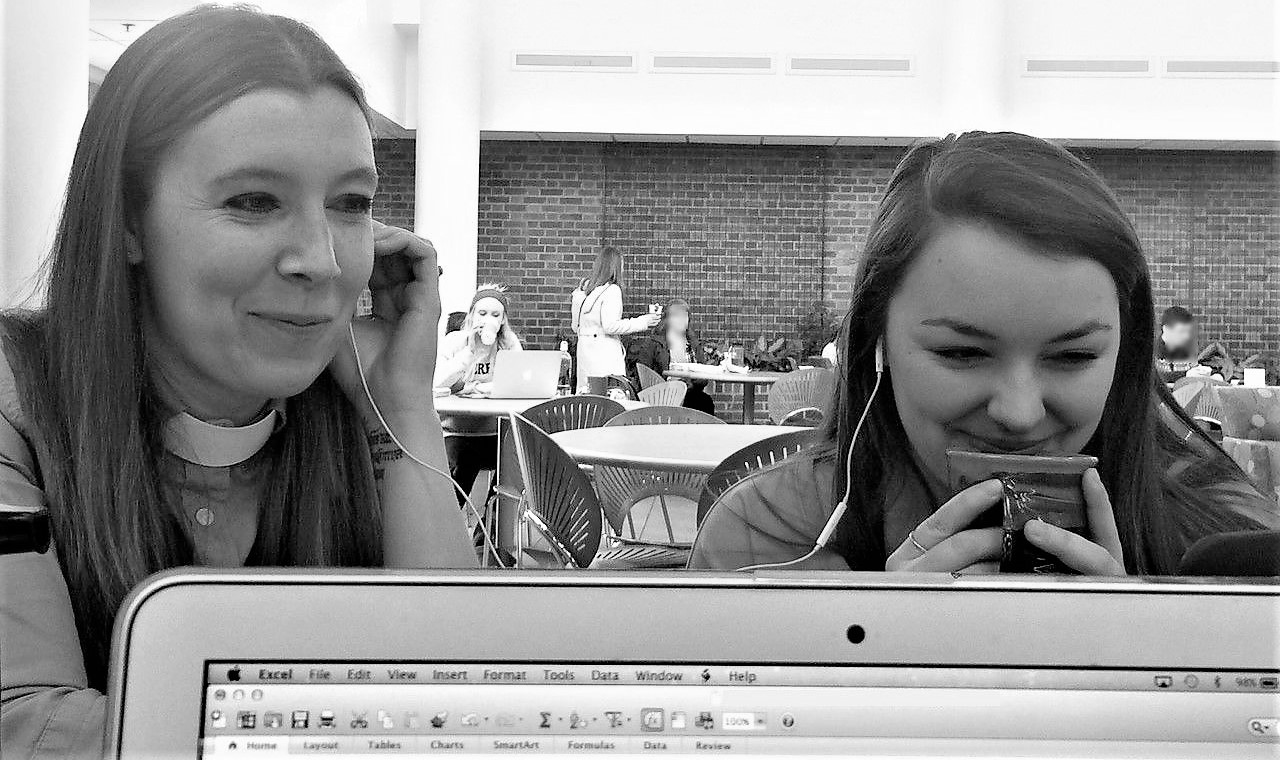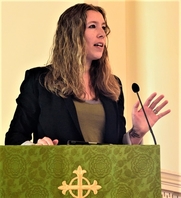
Deacon Erin Moniz shares a moment with a student at Berry College
By Rev. Dcn. Erin Moniz, Assistant Chaplain, Office of the Chaplain, Berry College
“His divine power has granted to us all things that pertain to life and godliness, through the knowledge of him who called us to his own glory and excellence, by which he has granted to us his precious and very great promises, so that through them you may become partakers of the divine nature, having escaped from the corruption that is in the world because of sinful desire.”
2 Peter 1:3-4

Working with college students means that from day to day or hour to hour, I might be speaking theologically about relationships, identity, justice, depression, the authority of Scripture, the division of different denominations, parents, freedom, God in the Old Testament, or politics; and this is just by 2 pm on a Tuesday. I read constantly in order to stay informed on the range of topics I might need to speak to on any given day. The demands of student ministry truly stretch the spiritual imagination and keep me happily on my toes.
Upon reflection though, the passage of Scripture I quote most frequently in sessions with students is 2 Peter 1:3. It usually comes up like this: “Right now, in this very moment, because of Christ, you are full, complete, lacking nothing for life and godliness. That is who you are. You are adopted, chosen, and loved. You don’t have to earn it or achieve it through some ladder of good deeds. Your identity right now is a child of God, dearly beloved and filled with the Holy Spirit.”
Sounds good, right?
But the next thing we recognize almost immediately is: “Chaplain, that might be true, but I don’t feel full or complete.”
I can’t argue with this. In my own life, even as a minister who knows the truth of the gospel, my actions reflect that I am a functional atheist who does not believe that I have everything I need for life and godliness. I forget that “he has granted to us his precious and very great promises” and I live like an orphan trying to siphon my identity through work, relationships, or grand presentation.
About 15 years ago, I read about a man in New York who died leaving his millions to his only living relative: his estranged brother. The lawyers had to hire a private detective because it had been years since anyone had spoken to or seen the brother. It took nearly two months, but the detective finally found him living out in California. He was homeless, living on the streets, and sleeping under bridges.
What struck me most about the article was not the astonishing revelation that this homeless man was delivered such good news that he was now a millionaire. What struck me was the fact that for two months, this homeless man was legally a millionaire. All those nights, he slept under bridges and ate out of dumpsters even though there were millions in his bank account.
Sometimes, not knowing you have something amounts to living like you don’t have it.
He had millions! Yet, he ate out of dumpsters because he didn’t know that he was a millionaire. Day to day, when I forget the promises of God, I forget that I have money in the bank. I forget that I have been adopted and brought to the big house with all the food and love I could ever need or want. Many mornings, like my students, I wake up forming a plan on how I am going to get what I feel I lack and when I think it is all up to me, I resign myself to rooting through dumpsters and sleeping under bridges because I have forgotten that I am rich. I have forgotten who I am.
My college students struggle with this regularly. The great promises of God and the abundance of His Presence slip into spiritual amnesia and we begin to live out of want and lack. However, one of the great blessings of my work is that I get to sit day after day and share this message with students. And as I tell them who they are in Christ, I am also reminding myself. I speak the gospel back into my own ears with every ministry opportunity.
Our students need this, but so do I. I tell them they need to surround themselves with people who will remind them regularly of what Christ has done and who they are. As Stanley Hauerwas articulates: “Saints cannot exist without a community, as they require, like all of us, nurturance by a people who, while often unfaithful, preserve the habits necessary to learn the story of God.”
Originally published April, 2019. Editorial assistance, Rachel Moorman, news@adots.org
